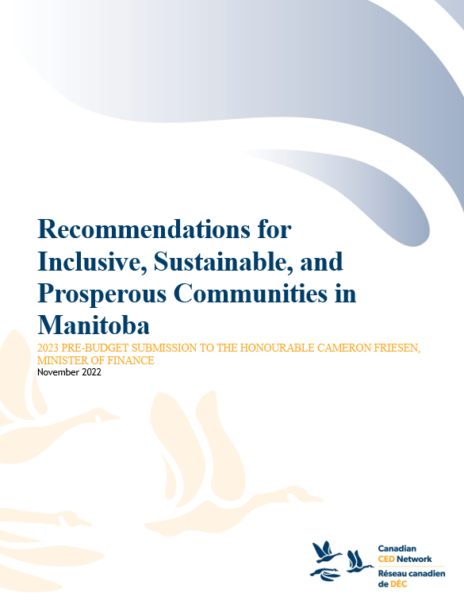Recommendations for more inclusive, sustainable, and prosperous communities in Manitoba were shared with the Government of Manitoba recently through CCEDNet Manitoba on behalf of the Network’s over 80 member organizations in Manitoba.
In late November, CCEDNet Manitoba submitted its 2023 budget submission to the Province of Manitoba, including the Minister of Finance, six other cabinet ministers key to Community Economic Development, and numerous civil servants.

Our Network stands behind these recommendations as contributing to key priorities for our province: an inclusive & sustainable economy, meaningful employment, affordable housing, and investing in safer, healthier communities. We advocate for the inclusion of the following principles to be at the heart of Manitoba’s budget: Community Economic Development supporting locally led solutions, Reconciliation, Equity & Inclusion, and Sustainability and Climate Action.
Our members believe that when these solutions shared are scaled up, implemented, or enacted, they will serve to build fairer and stronger local economies, reduce poverty and homelessness, tackle climate change, and ensure sustainable and inclusive communities.
How the Network’s mandate is set
Our public policy mandate is the result of a democratic decision-making process. Every year, members of CCEDNet Manitoba work together to create a pragmatic, wide-ranging, and solutions-focused set of public policy resolutions. At our annual policy summit, members gather to discuss and ratify these ideas after completing consultations and drafting resolutions.
Summary of Recommendations
An Inclusive & Sustainable Economy through Community Economic Development
- Ensure that social enterprises, cooperatives, and community-based organizations (CBOs) are part of an inclusive economic recovery from COVID-19 through strategic development support
- Enhance government procurement by intentionally generating economic, social, and environmental outcomes, including creating meaningful employment opportunities, by:
- Requiring social, environmental and/or economic community benefit outcomes when purchasing goods and services by including them in the bid evaluation process, with a particular emphasis on employment and training outcomes
- Creating set-asides in purchasing for access by social enterprises, cooperatives, and/or non-profits
- Support ecosystem development and resources that support innovation and collaboration within the community, such as funding of networks and member associations
Addressing the Labour Shortage with Meaningful Employment

- Stabilize and increase workforce training funding for organizations and/or social enterprises who work alongside low-income communities/individuals with barriers, including organizations providing long-term supports for Indigenous job seekers
- Expand the core funding for the Youth Employment Hub and First Jobs 4 Youth programs to Neighbourhood Renewal Corporations and other community-based organizations across Manitoba through the Department of Families, learning from the successful model at Spence Neighbourhood Association.
- Establish a streamlined and non-stigmatizing fee waiver system that enables low-income Manitobans to obtain or replace a birth certificate free of charge. Ensure that incarcerated individuals are provided with necessary identification, either entering or exiting incarceration, as well as youth exiting Child and Family Services prior to transitioning out of care.
Housing Affordability & Energy Efficiency
- Support the capacity of community-based organizations, social enterprises, and cooperatives to build and own more affordable and energy efficient housing through better government and sector alignment, support for organizations to leverage funding, and direct government support.
- Prioritize retrofitting existing social and affordable housing stock while creating employment opportunities in the green economy
Investing in Our Communities
- Renew and restructure the Building Sustainable Communities program for community-led development with multi-year, streamlined funding.
- Resource and enable the Manitoba Social Finance Working Group to establish provincial financing opportunities for enterprising non-profits, social enterprises, and cooperatives that are sensitive to the unique needs of these organizations and that contribute to further social innovation.
- Strengthen and utilize the Community Enterprise Development Tax Credit as a financing tool for Manitoba community groups, cooperatives, and social enterprises.




